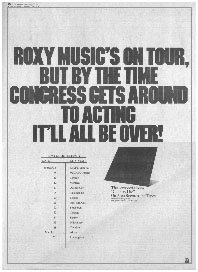![]()
 |

Country Life
Roxy Music
Atco 106
Released: January 1975
Chart Peak: #37
Weeks Charted: 15
 Decadence is nothing new in rock. The original Velvet Underground flaunted it, David Bowie exploited it, the New York Dolls seem to have sunk in it. What is different about Roxy Music, pop's latest specialists in depravity, is the wit with which Bryan Ferry, Roxy's guiding light and lead vocalist, evokes not only decay but also a last fling in the face of fate. To quote the opening track on Country Life, Ferry, standing on the precipice, relishes "the thrill of it all."
Decadence is nothing new in rock. The original Velvet Underground flaunted it, David Bowie exploited it, the New York Dolls seem to have sunk in it. What is different about Roxy Music, pop's latest specialists in depravity, is the wit with which Bryan Ferry, Roxy's guiding light and lead vocalist, evokes not only decay but also a last fling in the face of fate. To quote the opening track on Country Life, Ferry, standing on the precipice, relishes "the thrill of it all."
Ferry approaches decadence, not through tales of self-destruction or redemption, but by depicting romance corrupted. It's easy to moan about heroin, like Lou Reed, or trumpet the coming superman, like Bowie; the prescribed response is either shock or, if one is inured to such antics, a yawn. But to fashion an album filled, like Country Life, with relatively straightforward love songs that come out sounding like the Decline of the West is no mean feat.
 Click image for larger view. |
Thus far, American listeners have been cool toward Roxy's brand of dissolute rock, perhaps because of the band's pretensions. Some critics even seem to prefer Ferry's solo efforts (These Foolish Things and Another Time, Another Place), with their bizarre recastings of such familar oldies as "The 'In' Crowd." But what is interesting about Ferry is not so much his singing (that, taken by itself, is at best a curiosity); rather it is his total conception. To date, Ferry's chosen vehicle for that conception has been Roxy Music, not his solo ventures.
Mindful of his difficulties in cracking the American market, Ferry has designed Country Life with an eye to commercial acceptance. He may in fact have succeeded: Thanks to the glossy production and direct lyrics, Country Life makes about as accessible an intruduction to Roxy Music as Ferry is likely to cut. While it may lack the dark mysteries of Stranded, 1973's Roxy LP, the album does boast an aura of malignant lust all its own.
Roxy Music, given the nature of Ferry's posturing, risks sterility by reiterating the same themes for much longer. Despite such limitations, Stranded and Country Life together mark the zenith of contemporary British art rock.
- Jim Miller, Rolling Stone, 2/27/75.
Bonus Reviews!
Further reading on Super Seventies RockSite!: Album Review: Seventies' Greatest Album |
- Billboard, 1975.
The Teutoni-textures of this music are proof negative of Bryan Ferry's deep-seated romanticism. But what happens when romanticism goes sour? And what is Phil Manzanera doing on that Nico record that closes with her version of "Deutschland Uber Alles"? Oh well, I've always said good rock has to be dangerous. But when did I say it could be slow? B+
- Robert Christgau, Christgau's Record Guide, 1981.
Arguably their best album, Country Life's everything-and-the-kitchen-sink art-rock production and steely dissonance reached a pinnacle with tracks like "The Thrill of It All," "All I Want Is You," and "Casanova." "Out of the Blue," one of their finest songs, showcased Eddie Jobson on a powerfully phase-shifted violin solo. The beautifully unsettling "Bitter-Sweet" reflected Byran Ferry's flirtation with Germanic melodicism and fascist imagery. * * * * *
- Rick Clark, The All-Music Guide to Rock, 1995.
Bryan Ferry met Roxy Music fans Constanze Karoli and Eveline Grunwald in Portugal when he was writing the lyrics for Country Life (the band's fourth studio album) and asked them to model for their new album cover. The resulting photograph of the German girls caused a sensation -- the flesh on view, combined with the suggestive placement of the girls' fingers, was deemed too risqué by many retailers, leading to less-suggestive artwork in many countries.
It is impossible to tell if the album would have been as successful in America without this controversy. In the UK, however, critical response upon its release was most positive. Roxy Music were previously positioned between glam-oriented art rock and sophisticated, elegant pop. With the departure of Brian Eno after their second album, the band was noticeably shifting away from its original concept, but it would still be a while before the adult pop of Avalon would eradicate the traces of their past.
While the strongest tracks, "The Thrill Of It All," "Prairie Rose," and "Casanova" were praised at the time, it is curious that the theatrical ballad "Bitter-Sweet" (the German lyrics translated for Ferry by Grunwald and Karoli) was dismissed at the time of the album's release. This, as well as many other Roxy Music tracks, was included in Todd Haynes' 1998 glam-rock movie Velvet Goldmine. Re-recorded with Radiohead's Thom Yorke on vocals, this later version of "Bitter-Sweet" not only unearthed a new audience for Roxy Music's earlier work, but also proved that their influence extends far beyond their popular singles.
- Alexandra Heller-Nicholas, 1001 Albums You Must Hear Before You Die, 2005.
![]() Reader's Comments
Reader's Comments
No comments so far, be the first to comment.


